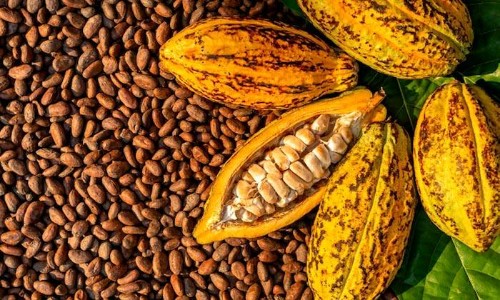Nigeria experienced a 304 percent increase in cocoa exports during the first quarter of 2024, driven by a surge in demand and the weakening of the naira, based on figures released by the National Bureau of Statistics (NBS).
Cocoa exports from the country made up 42.4 percent of the N1.04 trillion total agricultural exports for the quarter, climbing significantly to N438.7 billion in Q1 2024, compared to N108.6 billion during the same period in 2023.
Cocoa prices jumped by more than 567 percent in the first quarter of 2024, exceeding N12 million per metric ton for the first time domestically. This was caused by a major supply shortfall from Ivory Coast and Ghana, two key producers, disrupting the global market.
The price boom encouraged Nigerian cocoa farmers to revive old plantations and plant improved seedlings, replacing aging trees and expanding their farms.
“You can imagine the efforts and the returns that are coming from the export of cocoa,” said Adeola Adegoke, national president of the Cocoa Farmers Association of Nigeria, (in a chat with BusinessDay).
“It shows that if governments and all of us at the private sector can remain focused in terms of increasing and decentralising the production of cocoa, Nigeria could be producing about 500,000 to 600,000 metric tons,” he added.
He said the revenue from cocoa exports in the first quarter highlights the vast potential of cocoa production in Nigeria. He believes this potential could be fully harnessed with the right level of attention and investment, helping to increase national earnings.
Despite the jump in export earnings, Mufutua Abolarinwa, national president of the Cocoa Association of Nigeria (CAN), pointed out that output levels have not changed.
Abolarinwa noted that the increase in export income doesn’t match the actual production volume.
“The reason for this high revenue from cocoa export is because of the dollar exchange rate,” he said. “Production did not necessarily increase from its current 280,000 metric tons.”
According to the International Cocoa Organisation (ICCO), Nigeria ranks as the fourth-largest cocoa producer globally with 280,000 metric tonnes produced during the 2022–2023 season, following Ivory Coast, Indonesia, and Ghana. It also stands as the third-largest exporter after Ivory Coast and Ghana.
During the first half of the year, cocoa prices reached record highs of $12,000 per tonne in April 2024, according to ICCO data.
On the local scene, cocoa bean prices have also spiked due to the weaker naira. Farmers have reported better profits during this price surge, with many returning to their farms to take advantage of the favorable market.
Sayina Riman, a cocoa grower from Ikom in Cross River State, told BusinessDay that he dedicated more time to his farm this year than in previous years.
“I paid more attention to my cocoa farm this year than before. I pruned the undergrowth and applied liquid fertiliser, which is something I have never done,” Riman said.
He said his income grew by 200 percent, although a large portion of it was spent on labor costs.
Oba Dokun Thompson, the Oloni of Eti-Oni and chairman of the Eti-Oni Development Group, who also produces Gureje IV chocolate bars, emphasized the need to focus on value addition in cocoa, beyond just the financial returns.
He said that the ongoing price rally is not sustainable, as more cocoa-producing regions are increasing their capacity, which could result in a drop in prices within the next two years.
Thompson encouraged farmers to keep up the momentum Nigeria has seen so far in 2024 and emphasized the importance of developing the cocoa industry as a value-added sector.
“Government needs to support innovation and creative ideas, new ideas and new ways to ensure that there is a clear understanding of the cocoa industry,” he said.
The chocolate maker added that in order for Nigeria to establish a strong cocoa culture in West Africa and across the continent, government support for the sector is crucial.

 BIG STORY4 days ago
BIG STORY4 days ago
 BIG STORY2 days ago
BIG STORY2 days ago
 BIG STORY4 days ago
BIG STORY4 days ago
 BIG STORY3 days ago
BIG STORY3 days ago
 BIG STORY3 days ago
BIG STORY3 days ago
 BIG STORY4 days ago
BIG STORY4 days ago
 BIG STORY3 days ago
BIG STORY3 days ago
 BIG STORY4 days ago
BIG STORY4 days ago
























